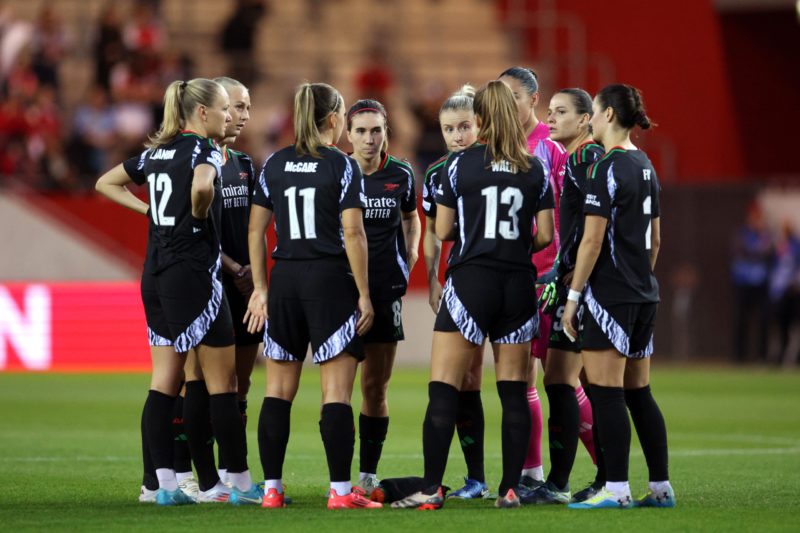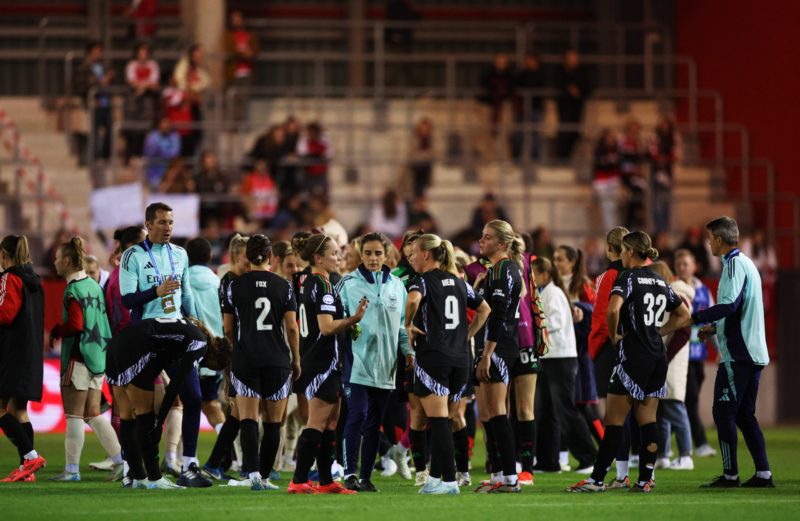Arsenal’s Champions League campaign got off to a rocky start as they suffered a heavy 5-2 defeat to Bayern Munich.
Despite keeping the game level until the final 20 minutes, multiple defensive errors and an inability to adapt to Bayern’s intensity cost Arsenal dearly. The result has raised questions about Jonas Eidevall’s tactics and the team’s direction moving forward.

Arsenal’s Champions League group stage opener ended in a big defeat, 5-2, despite being level at 2-2 with 20 minutes to go. That kind of collapse, with multiple defensive errors, should not happen.
So, what are the roots of that bad performance? Individual errors that can be easily rectified, wrong tactics, an opponent playing excellent football?
There is no doubt FC Bayern played really well in the second half and took the game by the scruff of the neck.
Jonas Eidevall put his tried and trusted 4-4-2 starting XI out with Zinsberger; Fox, Williamson, Codina, McCabe; Little, Wälti; Foord, Maanum, Blackstenius, Caldentey. So no extravagant gambles on starting players or out of the ordinary tactics. A classic team for a European away tie.
Arsenal scored from a corner with Codina heading from a McCabe in-swinger and Caldentey also scored from a McCabe assist.
Scoring two away at Bayern is not a bad performance, far from it. But the defensive work left a lot to be desired and questions have to be asked why marking on crosses and set pieces was not good enough, i.e. was it a team or individual responsibility that led to so many goals?
The team was also caught in transition, with players out of place and holes everywhere on the pitch. That was not Arsenal-like under Jonas Eidevall, quite out of character.
If we look at the results so far this season, there are four wins, two draws (both in the league) and two defeats (both in Europe).
Under Jonas Eidevall, Arsenal have always been a team that build their game on proactive defending either via high press or with a medium-positioned defensive block. And the biggest problem has always been finding a way to score against a low block, due to lacking creativity to manufacture good goal-scoring opportunities.
We are now in the fourth season under the manager and it seems there is little progress on the attacking side of things.
The squad has been remodelled and players who did not fit the profile, like Iwabuchi, Nobbs and Miedema, have gone. Creativity is still stifled and a recent Chloe Lacasse interview shed light on the attacking problems for the team:
But ultimately, she felt the system implemented by Arsenal, with a heavy focus on the tactical side of the game, didn’t allow her to shine.
“At the end of the day, you want to get minutes, you want to score goals, you want to be able to be creative and be the type of player that you are,” she said. “And I think my type of characteristics were being a little bit limited and a little bit restricted at Arsenal, which didn’t allow to bring out my best characteristics.”
Does it mean there is a problem with the message going to the players? The question, as asked by Tim after the game:
“No, it doesn’t (give Eidevall cause for concern). We are off with our timing with pressing in the second half. I don’t feel like there is a misunderstanding of the message of what we need to do. I agree with you, we don’t defend well enough in the second half and I am not happy with that, but I don’t think that is a result of miscommunication or a lack of clarity of the idea of what we need to do with those situations.”
I have always maintained that a manager should only go if they have lost the dressing room. You can have a batch of bad results, but it does not mean the manager has to go.
As long as the players have belief in what the manager is trying to achieve and what the game plan is, there is no real problem. We are reaching the territory where you have to wonder if the manager’s message on the attacking side of the game is getting through to the players, if they understand what is being asked of them.
In the past, the players’ positioning was extremely rigid in attacking phases. Players would stay in their zone and try to create chances, making things predictable. Nowadays, players go out of their zone more freely, full-backs invert, it is more chaotic (which is a positive thing), but creating good quality chances is still a problem.
So is it a player quality problem or an organisation problem?
Have the players lost confidence in the manager? There is no doubt they are not happy with the performance level; we saw them last Sunday at the Emirates and they were not happy about it.
Having seen Chelsea against Real Madrid, where they did the same as Arsenal, slowly building up play until the final third, then they play quickly and accurately in that zone with pace on the wing and a strong forward to go through or around the opposition low block.
Their set-up is similar to the Arsenal one and their players are of similar quality, too. What Chelsea can do, Arsenal should be able to do, too.
On Saturday, the London derby will take place and Arsenal cannot lose to Chelsea; otherwise, there will be a virtual seven-point gap between the teams (four in reality and a game in hand for Chelsea).
Defeat would put the Arsenal manager in a dangerous position, although with Valerenga at home and West Ham away coming the following week, you could wonder if a manager change would come at a later date.
There is no doubt that a win against Chelsea is needed to lessen the pressure that is building up on the Arsenal manager.
